How to Make a Cheap and Easy Compost Bin for Small Spaces
This website may earn commissions from purchases made through links in this post.
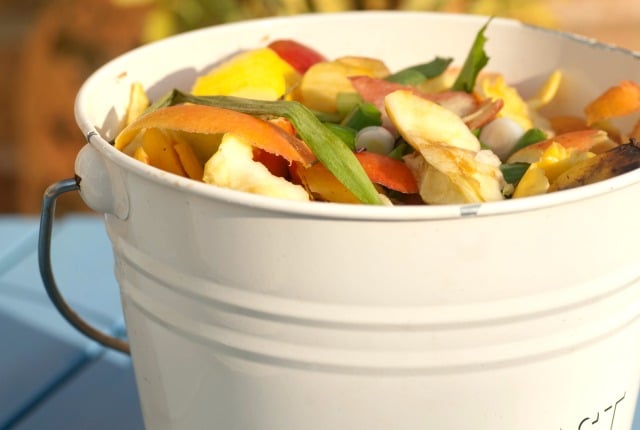
I was hesitant to compost.
We have a small yard. And don’t those things stink?
Sometimes you just have to take the plunge and learn from hands-on experience, so we made a compost bin and gave it a go.
Here’s what I learnt.
Compost bins don’t stink. Actually, compost has a deliciously earthy hummus smell. And depending on what you’ve been cooking lately, it may be lightly scented with onion or garlic.
If it’s smelly, you’re composting wrong. But it is super, super easy to fix. And I explain how below.
And even if you have a small yard, even if you only have a balcony, you can fit a small compost bin in. Making your own will either be FREE or cost you less than $10 if you buy the bin.
Here’s how to do it.
HOW TO MAKE YOUR COMPOST BIN
What you will need:
- A small bin or two.
- A drill or hammer and large nail.
- Wet and dry compost
We opted for a small food-grade bin for our compost bin. Sometimes you can pick these up free from bakers or caterers or you can buy them cheaply from the hardware store. Any container with a lid will do nicely (and old, unused nappy bucket with lid is another alternative), but a round one will be easier to aerate.
If you have more room, you might opt for one of the larger black garbage bins. Just make sure to check that the lid locks. If it doesn’t, you will want to get a bungee strap or similar to secure the lid.
To drill the holes in the bin, you’ll need a drill and a fairly large drill bit. If you don’t have an electric drill, use a hammer and nail to hammer in holes at regular intervals.
To prepare your compost bin, simply drill some holes in the base, lid and sides (or get your other half to do it), and you’re done.
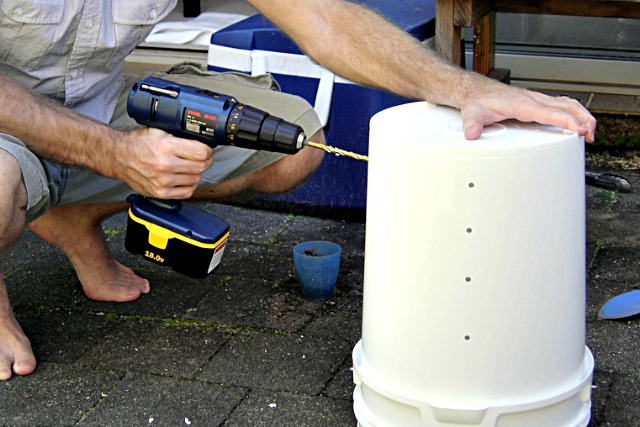
Don’t be stingy with the holes, air is important for helping the compost break down and for keeping it stink free. We put about 8 rows of 4 holes in the sides of our bin, about 8 in the bottom and 6 in the top.
For the next bin, I was thinking of getting a little poly pipe that can run up the centre of the bin, and drilling holes in it to help aerate the compost from the centre out. I thought this was ingenious until I read this very hint on another website (which I cannot remember to link to, sorry).
Making Compost
To make compost, you need both wet and dry (nitrogen and carbon) ingredients.
Wet ingredients include kitchen scraps as well as lawn clippings, prunings, manure, coffee grounds, egg shells etc. For a lovely smelling compost, avoid putting meat and dairy in your bin.
Dry ingredients include straw, egg cartons, dry autumn leaves and shredded, non-glossy paper.
As a rough guide, you’re looking for a ratio of around 30:1 dry ingredients to wet ones, although you don’t have to get mathematical; looking, smelling and feeling will be your best guide (more info here).
Check the moisture levels when you add your kitchen scraps to make sure it’s not too wet. If your compost is too wet, it will smell gross. Fix it by adding more dry ingredients and mixing them through.
A handful of compost should be damp and you should be able to squeeze a few drops of moisture out of it, but no more.
Another indication of good compost is earth worms. They are your composting friends who will help break down your compost and leave their ‘castings’, which your garden will love.
If your compost is too dry, it won’t decompose. Add a little water or more vegetable scraps.
Here’s why having a round compost bin is easier than a square one: once or twice a week, knock the bin over, roll it around on the ground a bit then stand it up again.
This will help aerate your compost with relatively little work. A stir with a stick will do the same thing.
Composting Practicalities
Keep a small container or bucket near the sink to throw your scraps in during the day so that you only make one trip to the bin each day. In hot weather, your scraps will start composting right there in your kitchen, so you’ll want to empty this bin every day.
Apart from air and water, the other main ingredient for decomposition is heat. The potential down side of having a small bin is that larger piles tend to generate more heat. So you will need to keep this in mind when deciding where to place your bin in your yard.
If you want to speed up the composting process, check out this article on how to make compost fast.
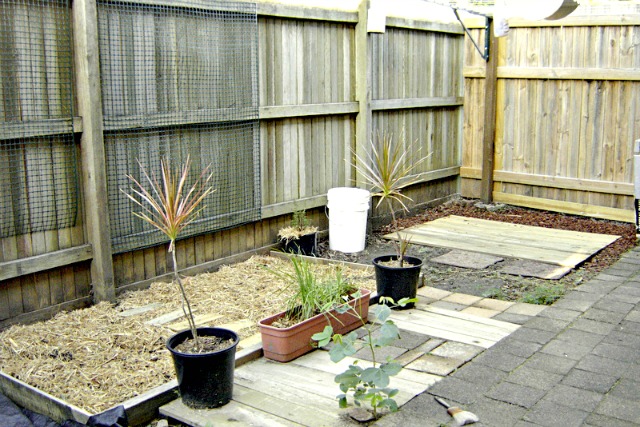
I put off making compost for a long time because it seemed too hard and complicated. It’s neither. Even if you have the smallest yard or balcony, you can fit in a small compost bin. It’s easy and convenient and anyone can do it.
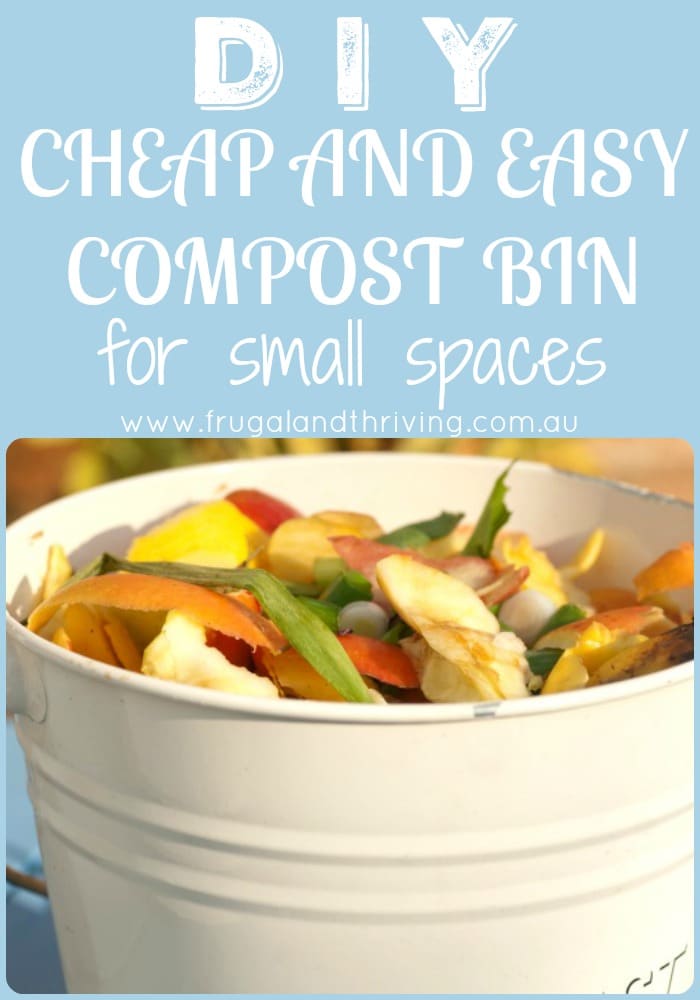

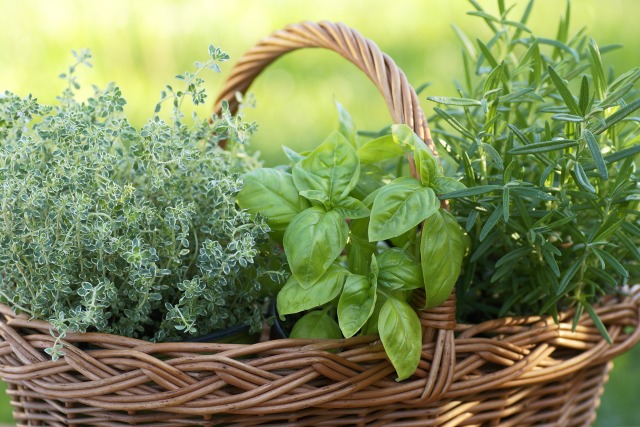
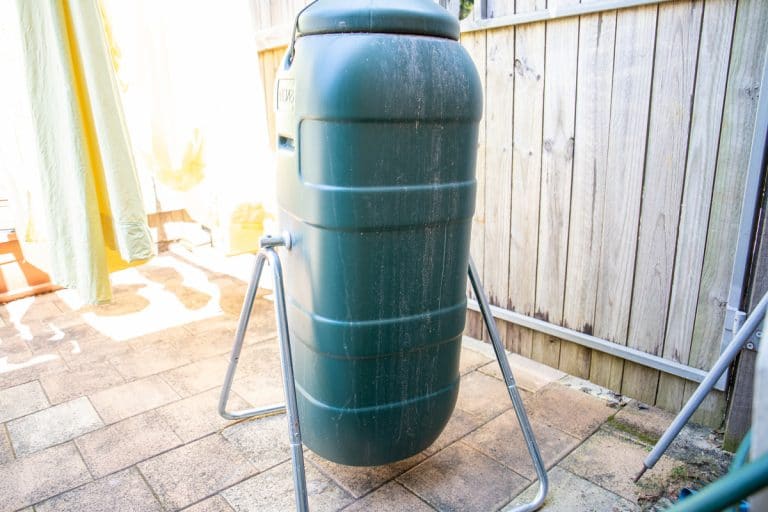
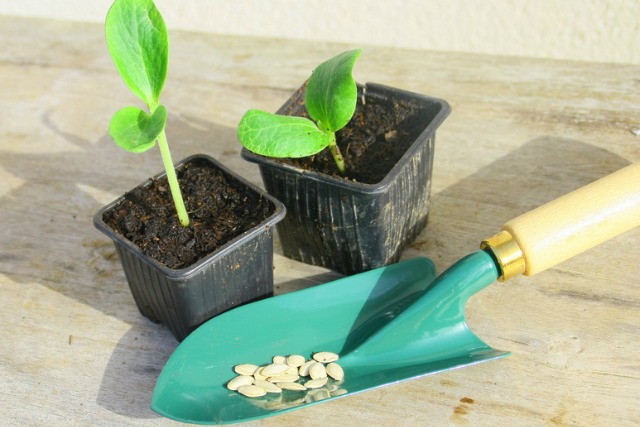
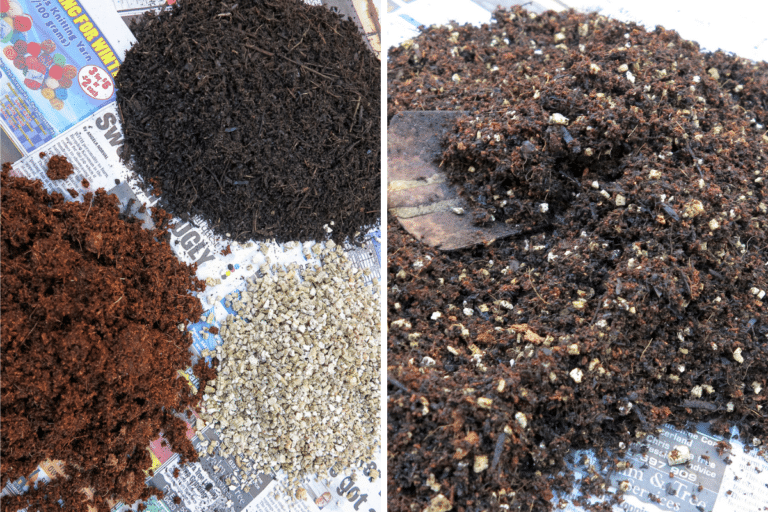
I got a “can o worms” for a birthday present about 2 years ago, so I can relate to the exitement :) The benefits of a worm farm over compost in my eyes are time and output. Liquid organic (depending on what you put into it) every two weeks is often recommended for vegies etc. And I have enough to share with friends, I even sold some :)
Set up costs are mostly getting the worms, around $15-$30 to get you started. DIY worm farms are easy to get plans for, (google/ you tube etc) and fairly straight forward to make.
No, or very little odour. Liquid and solid fertilizer and “pets” which are easy as to care for!!!
I would recommend a worm farm to anyone. They are the “lazymans” (or busywomans/mans) best option in my humble opinion.
Mel, the diggers club (aussie gardening club) is an amazing resource, with loads of info on growing your own, and some scary facts about how crazy corprate ownership of altered plant copyrights is affecting our world.
Your a smart, motivated woman, please check them out.
I looked into worms, but decided to go compost bin – I’ve read about putting worms into your compost and putting a saucer at the bottom to catch the liquid, this was on my mind when we were making it ($10 outlay, what can I say, we’re on a budget :) ).
Diggers is great! My dad always bought seeds from Diggers – we chose Eden seeds for the simple fact that they are closer and so less transport.
I know what you mean about the corporate ownership of seeds. I’ve read quite a lot into it over the last few years and keep meaning to write an article about it, but I’ve gathered so much info, I don’t know where to start, so keep putting it off. It certainly makes my blood boil!!
Particularly Monsanto and the whole arguement about ‘saving the third world from starvation’ when in fact it’s making things worse!!! That’s why Diggers and Eden seeds and other open pollenated or traditional seeds are vital. I read an article recently that Bill Gates is funding a seed bank along with Monsanto and other parties. It was a bit of a conspiracy website, so not sure how true their claims were, but it was interesting and quite scary.
The other reason I haven’t written about it yet is that there are so many websites that I read that focus on these bad things and it can really get me down. I prefer to focus on the more positive, constructive ‘so what can we do to make things better’ stuff, just because I can feel so overwhelmed with all that is wrong with the current global economic system, that I think others must feel overwhelmed too.
I have to admit I’ve written several angry rants lately, but I decided not to publish them :).
did I mention I love the straw to help “activate” and mulch the garden bed (in your photo) Great idea :)
Great for keeping the weeds away – we use the no dig method (although my son would prefer the dig method :) ). And when it breaks down, we just add more with compost. It’s cane mulch – a local product, smells lovely and sugary.
This post was exactly the motivation i need to get started on my compost bin, I have I have been thinking of starting this as a project so thanks,
….
Thanks Maureen, hope it turns out well! It took me ages to get around to it, but it really only took 30 minutes to set up (and that includes walking to Bunnings and back :)) although we worked on it over the space of a few days.
This is great! I shudder to think of my big scary compost bin out the back. I put all my scraps in it, but it’s covered in cobwebs and home to many a scary looking creepy crawly. I’m sure it’s the lack of aerating that does it. I’ll clean it out and start fresh one of these days, then I’ll be sure to look up this post.
Bet there’s some nice compost in there though! Love your blog, love the dripping pot! Homemade potato chips deep fried in dripping – there’s a guilty pleasure I don’t often admit to :).
Congratulations on the birth of your new compost bin. Clever idea. I love, love, love mine. My next door neighbour was shifting and I offered to buy his from him (unused) and he said I could have it! I repaid with home made sausage rolls. Anyway, my bin is wonderful. Aerating is the key and moisture. I also add manure occasionally. I love the smell of cow manure. Alas my family don’t share my fondness for this aroma or me when I do my springtime fertilizing. On the other hand the dog and I have bonded over gardening:)
I love the smell of ours at the moment, especially the scraps, lots of onion-y garlic-y smells. And I share your fondness for cow dung smell, reminds me of cow patty fights as a kid :).
I think mine is too dry at the moment – fear of smells going bad – I’m in experimental phase.
I love the mini compost bins! We have a giant compost pile made out of old pallets, and its disadvantage is that it is huge so I never turn it, just keep piling stuff on. It must be compost gold right down the bottom, but I’ll require a front end loader to find it. Your bins are perfect, and your little yard looks so neat and sweet.
Thanks Jo – I cleaned the yard up for the pic – normally it’s littered with containers and spades and matchbox diggers :).
http://fivegallonideas.com/fence-or-wall/ just found this and thought you might find it interesting, loads of very interesting, funtional ideas for those big white buckets here :)
Great ideas – now all I need is a free source…
Trying to make one so what size holes would you recommend ? I have a bin drilled with 3/8inch holes whic my wife thinks is too big. Would 1/4inch be better?
Cheers & Tks
I had to ask DH what drill bit he used – he said it was about 1/4 inch. But I don’t think it will matter as long as your compost doesn’t fall out! You probably won’t need as many holes if they are a little bigger. Best thing – try it as is and adjust later if it’s not working for you. Hope that helps.
I have a D.I.Y.compost bin, in fact two now. One is asleep while the other is in use. I used a large black rubbish bin (from Bunnings for $10) with a tight fitting lid that I cut the whole bottom out. I did not drill any holes to the bin as i feel it doesn’t need it. A compost will really benefit from being able to be in contact with the earth, the micro organisms will accelarete the process. I have a special tool for turning the compost which needs to be done at least twice a week. This tool is also from Bunnings, it looks like a huge corkscrew that lifts the older matter to the top. Aerating relly is the key – if this doesn’t get done your compost will not turn out as expected. You also cannot keep adding stuff onto it – it has to have some time rest. No meat or dairy, this will attract vermin and smell nasty. Creating home made compost is really easy, but you do need to make some time to look after it. Same with a worm farm.
Hello, and lovely post! We just moved into a Condo this last fall, and are growing our first ever garden this year! I made a little raised cinderblock bed in an area we are probably/hopefully allowed to ;) no one has complained yet! I really want to start a compost pile, and this idea is perfect for sticking it out on our closed in patio so it doesn’t bother anyone! thanks for the tip! Silly question, but how long does it take for your compost to break down to the point where you can use it? I’m new to all this!
Thanks for the lovely post!
It depends on how small you break down your food scraps, the balance inside your compost bin and the temperature outside too. It usually takes a few months before it’s ready for the garden.
I just found your website while looking for a smallish compost bin – super site, thanks! This post was written a few years ago and I was wondering how your little white bins worked out? Susie :-)
Hi Susie, thanks for dropping by. We’re still using that compost bin (when I’m not being lazy :) ) and it still makes great compost full of worms!